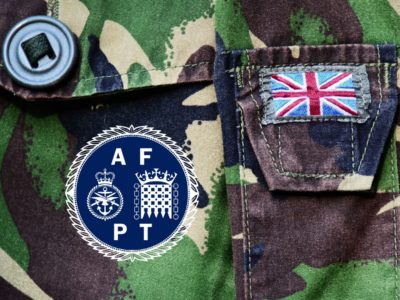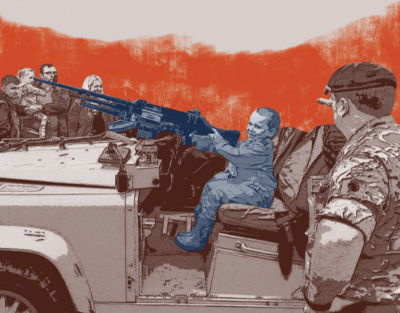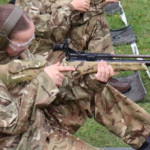York Armed Forces Day: ‘rage-bait’, militarism and the authorised ‘knowers’
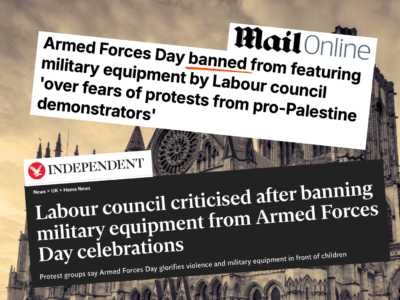
Controversy around York’s Armed Forces Day 2025, held on 5 July, caused a stir in the national press after it was reported that military equipment had been ‘banned’ by the local Labour council. Yet key details were either missing from, or misrepresented in, coverage about the supposed ban, as ForcesWatch’s Joe Glenton, a York resident, reports.
Inaccurate, partial and unevidenced claims were made in the press about a decision to not have military equipment present at York Armed Forces Day (AFD). For example, it was suggested by The Independent that ‘fear’ about potential protests influenced the council’s decision. The Daily Mail carried quotes from a military ‘expert’ incorrectly linking recently proscribed group Palestine Action to protests in York. But a statement from the Leader of City of York Council suggests that the decision was not a result of some nebulous ‘fear’, but of a democratic process of consultation which directly involved the army and local residents. This key detail, and others, were missing from several stories in the national papers.
As a result, a degree of moral panic was generated. If a few key, publicly available, details had been included in the coverage stories they would have clarified the matter. Their omission gives the impression that some of the coverage was unserious, perhaps even intended to ‘rage-bait’ readers, and not proper journalism at all. There are questions about this confusing and ethically dubious reporting and about how military-related ‘moral panic’ stories are routinely used by some newspapers to engage readers. This is – in effect – an outrage economy, which we argue is guided by a synergy of populist demands, algorithims, and elite interests, which is meant to manufacture consent for militarist aims.
Inaccurate and emotional reporting fuels moral panic and misinforms the public, ultimately serving to narrow the space for the level-headed public discourse we need to have about war and militarism.
This kind of inflated reporting has been a regular feature of stories relating to the British military for years. ForcesWatch’s 2017 Warrior Nation report gives many examples of how inaccurate and emotional reporting fuels moral panic and misinforms the public, ultimately serving to narrow the space for the level-headed public discourse we need to have about war and militarism. This practice may be a very old one, but it re-emerged with force during the wars in Iraq and Afghanistan.
Report author Paul Dixon wrote (p11):
‘Powerful sections of the British political, military and media elite have used a range of rhetorical techniques to promote militarisation and war.
‘…the high prestige and popularity of the military in British society made it difficult to generate further support for the armed forces and translate this into support for the Iraq and Afghan wars.
‘Therefore, “insults” and “attacks” on the military had to be invented or exaggerated (there have been genuine shortcomings and problems in the provision of support for the military) in order to produce ‘moral panic’ and the desired protective response from the public.’
Clearly this practice, having been found to have some purchase over the public mind, did not end with British withdrawal from those wars. The coverage also fits within a broader framework of manufacturing public consent, in this case for militarism.
Invented and exaggerated
With this in mind, let’s start with some basic details. The original controversy seems to have started with residents expressing concerns about the display of weapons and military vehicles. There seems to have been disagreement on this between Labour and Tory councillors. The council discussed the concerns with its ‘military partners’ and a decision was made to not have military equipment present.
On 5 July, Leader of City of York Council Councillor Claire Douglas was quoted by York Mix in response to a series of accusations from Tory party councillors. Douglas cited the council’s commitment to various measures, like the Armed Forces Covenant, adding:
‘With our military partners, we carefully considered residents’ concerns, and decided that the day will go ahead as planned, with the only change being no military equipment on show.
‘This decision in no way diminishes how seriously we take Armed Forces Day and our deep respect and commitment to those who serve, and have served.’
On 7 July another local publication, York Press, reported:
‘The Army’s spokesperson said they were proud of their strong relationship with the council and looked forward to working together on future initiatives.’
York Press quoted the army spokesman directly:
‘The council is responsible for the York Armed Forces Day event and its content.
‘We recognise that they had to make a difficult decision regarding this year’s arrangements that balances a spread of community interests.’
In the first instance, the army’s own statement undermines the idea that this was an egregious ‘ban’ of some kind. The army accepted the decision and it’s spokesman said the army looks forward to working with the council in future. Anecdotally, the reserve unit concerned, the Queen’s Own Yeomanry, often display their equipment in the city centre over the course of the year. It’s not at all uncommon to see children trying on body armour, handling weaponry and climbing on the vehicles which form part of the display.
But here is the crux: unless the council and the army are misleading the public – and we haven’t come across any evidence to suggest they are – please let us know if you have any – the military was itself involved directly in the decision process and agreed with it without official public complaint. The council itself was responding to local resident’s concerns. What we do not know is precisely what the process of engagement looked like. As far as we are aware no other changes to the event occurred in connection with this decision and Armed Forces Day went ahead as planned.
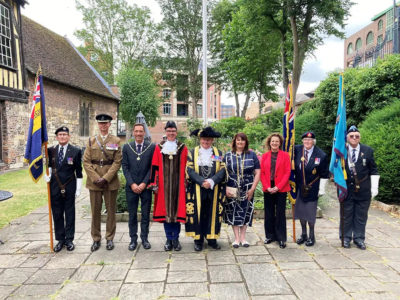
The Armed Forces Day flag raising ceremony in York on 5 July 2025. Photograph: City of York Council
While these basic facts are in the public domain, a number of national newspapers proceeded to platform commentary asserting some form of foul play had occurred on the part of York’s council. Some commentary came from local Conservative politicians. Some of it came from prominent former military personnel, including one serving government minister and a former government minister.
‘Extreme supporters?’
On 5 July The Telegraph quoted several Conservative councillors from York. Councillor Chris Steward claimed:
‘It shows how far the Labour Party has fallen from a proud, patriotic party which recognised the courageous and vital job our military do, to one more concerned how their actions may offend their increasingly extreme supporters who seem to want to protest against our long-held values.’
It is not clear why militarist ‘values’ can not legitimately and democratically be questioned, particularly in how they are manifested in public space.
In the same article, Conservative councillor Michael Nicholls claimed:
‘Armed Forces Day is an opportunity for us to say thank you and for the Armed Forces to show the next generation of recruits what they are all about, including the showing of equipment.
‘The priority of Labour in York appears to be not to offend those opposed to our values. How sad.’
These claims seem to be attempts at rhetorical point-scoring. No evidence is offered to support the claim that the decision was driven by ‘extreme’ Labour supporters. Additionally, it is not clear why militarist ‘values’ can not legitimately and democratically be questioned, particularly in how they are manifested in public space. We would add that in our understanding AFD is not officially a recruiting event. And even if it was, having equipment present during this single event is unlikely to arrest the military’s current recruiting issues, which are real, complex and widely reported, including by us. It is possible that residents were concerned about the way that AFD events use military equipment to spark interest in a military career in young children, which is something we are also concerned about.
Lord Mayor of York Martin Rowley, who also serves as a Conservative councillor, made a rather more thoughtful point:
‘We live in a very diverse city, a city of refuge, a city where we have Ukrainian families who have been deeply scarred by war. As a cosmopolitan city we have to be wary of everyone’s views. They have to be considered decisions.’
Fuelled by fear?
The notionally liberal The Independent newspaper took a rather surprising angle. The paper appeared to suggest that the council’s ban had been fuelled by ‘fears’ that two organisations would protest if military equipment was present:
‘Labour-controlled City of York council made the decision to ban the equipment over fears that the Peace Pledge Union (PPU), a pacifist organisation, and ForcesWatch, which is committed to “demilitarising the future”, said they would hold protests in the city this weekend.’
For the record, we do think the future should be demilitarised and we think you should consider getting on board. While we did not organise a protest in York, PPU had been contacted by someone who wanted our postcards for a vigil they were planning for the day. Given the PPU and ForcesWatch espouse pacifist and nonviolent principles this vigil should not have created ‘fear’ in anyone.
Our joint press release said:
‘Protest organisers have reported a three-fold increase compared with 2024, with demonstrations, vigils, stalls and flyering planned in over fifty locations this year.
‘Celebrations to mark Armed Forces Day will take place throughout the UK on 28th June featuring military parades, flyovers and displays of military vehicles. The occasion has long drawn criticism for its uncritical portrayal of the armed forces and warfare.
‘Peace campaigners have accused such events of “rebranding militarism as entertainment”. They say the rapidly growing protests reflect public outrage at the UK’s support for Israel actions in Gaza and Iran, as well as opposition to the deepening militarism in the UK in the wake of the government’s Strategic Defence Review, National Security Strategy and huge increases in military spending.’
As you would expect, we stand by it all. In fact if we’d known the coverage was going to be this intense, we’d have done our own stall. The fact that even mild criticism of militarism leads to the kind of outrage-farming we’ve seen in the press over this issue suggests we are right to do so. And we will keep offering far-reaching critiques of militarism. Because it’s our job.
Cavalry without horses
The Sun cited a ‘whistleblower’ who had spoken to the military banter site Fill Your Boots. The unnamed individual appeared to be a member of the Queen’s Own Yeomanry, whose Jackal vehicles were affected by the decision:
‘One said: “It was like asking the cavalry to come without horses. It is humiliating.
‘“They wanted to attend with the Jackal but they were told that they were not welcome.”
‘A whistle-blower told the Fill Your Boots military blog that the council was worried about “triggering a protest”.’
This individual is clearly entitled to their view. We lament the fact that military personnel have to maintain anonymity when talking to the press or risk disciplinary action. However this person seems to have been expressing a personal opinion outside the chain of command. We reiterate that the military have said they consulted on the decision by the democratically elected council. As we’ve evidenced above, an army spokesman commented on the issue, accepting the decision without complaint.
This fact seems to have been lost on Veteran’s Minister Al Carn, a former Royal Marine, who went for the tried and tested (and rather unconvincing argument) that the military are the ultimate guarantors of democracy and should be spared criticism as a result.
Carns told The Sun:
‘The only reason people have the right to protest is because our military provide the freedoms to do so.’
The Daily Mail went even further off-piste in it’s ‘rage-bait’ coverage. The paper quoted former British Army colonel and chemical warfare expert Hamish de Bretton-Gordon, who seemed determined to connect the feared protests with Palestine Action – recently controversially proscribed by the government as a terror organisation – and climate activism.
De Bretton-Gordon told the Mail:
‘It’s absolutely bonkers if a Labour council is seemingly supporting a proscribed terrorist group over the army.’
He added:
‘The military is there to protect the civilian community, but it seems at the moment whether you’re an activist against climate change or anything else they get the rub of the green rather than the people doing the hard yards.
‘It’s a hugely disappointing and the people who serve us – the council and MPs – need to man up a bit and stand for those on the right side of the law rather than capitulating to the likes of Palestine Action, that’s a proscribed terror group.’
It isn’t clear why de Bretton-Gordon said this. Because up until the point that he did, nobody appears to associated Palestine Action with York Armed Forces Day 2025. We’re also not clear why climate activists are dragged into it. Though we’ve produced some important work about the profound casual relationship between military emissions and climate crisis which you (and Hamish) can access here.
De Bretton-Gordon also told the Mail that ‘whatever people think about what’s happening in Palestine, it’s nothing to do with the British military’. This claim is simply factually wrong. As our friends at Declassified UK have reported, British forces have been actively involved in surveillance operations over Gaza and Israeli personnel have been trained in the UK. Additionally, there are persistent reports that there is a D Notice in place regarding UK Special Forces operations in Palestine. A D-Notice is a notionally voluntary self-censorship decided by a committee composed of senior military and security officials and newspaper editors. In short, the UK military, like the British state which directs it, and the British arms trade which blurs into both, is deeply involved in the assault on Gaza and has been from the start.
Ordinary folk
Hard-right TV channel GB News carried comments from former veteran’s minister Johnny Mercer. Speaking on behalf of ‘ordinary folk’, the privately-educated ex-British Army officer told the channel:
‘It’s in line with the kind of moral ambivalence and tokenistic interest we see in the veterans and in the military in this country. And to be honest, I think a lot in the military community are pretty fed up with it.
‘It’s embarrassing and I think the key thing is, it doesn’t really represent what ordinary folk think. Ordinary folk are incredibly proud of the military.’
He added:
‘You do have these outliers who who seem to think that everyone hates the military, whereas in fact, they’re this incredible force for good, this incredible life chances machine that you can go and have a great career afterwards from.’
Mercer also told GB News:
‘If you look at the statement York Council put out, they talk about the armed forces covenant and how they’re gold award holders and so on, but they’re not prepared to show military kit on parade on Armed Forces Day.’
The Armed Forces Covenant can be accessed here. It does not appear to address the issue of whether or not there should be military equipment on display at annual Armed Forces Day events. Although we have been critical of the way the Covenant has been used as a promotional tool for the armed forces, we’ve understood from it’s inception that it’s principal purpose is to ensure that serving and former military personnel’s have equality of access to various services. That doesn’t seem to have changed.
But this is not the first time the Covenant has been cited in relation to the deployment of military equipment. During the war in Afghanistan, General Richard Dannatt ran afoul of the last Labour government after citing the Covenant in relation to a lack of helicopters in theatre.
It remains our understanding that the Covenant is not, and never has been, about military equipment or equipment availability, whether this is on military operations or on display in small provincial cities. We’d expect a former veteran’s minister to reflect this in his commentary.
Official ‘knowers’
The function that ex-military officers carry out as part of the UK media’s thriving outrage economy is worth unpacking. Parts of the media ‘propaganda model’ proposed by Ed Herman and Noam Chomsky in their 1988 book Manufacturing Consent can be illustrative here. Herman and Chomsky are talking about the US. But the parallels should be evident:
‘The mass media are drawn into a symbiotic relationship with powerful sources of information by economic necessity and reciprocity of interest. The media need a steady, reliable flow of the raw material of news…
‘Economics dictates that they concentrate their resources where significant news often occurs, where important rumors and leaks abound, and where regular press conferences are held. The White House, the Pentagon, and the State Department, in Washington, D.C., are central nodes of such news activity.’
They are part of a large group of former military figures, overwhelmingly former officers, who are regularly given the opportunity to shape public discourse.
Chomsky and Herman argue that elite state and corporate interests are advanced through large, well-funded public relations bureaucracies. These are designed to align with and feed the parallel bureaucracies of modern news organisations. The officers mentioned above, while notionally outside those bureaucracies, are regularly invited to give commentary in the press and on TV. They are part of a large group of former military figures, overwhelmingly former officers, who are regularly given the opportunity to shape public discourse. Others include Colonel Richard Kemp and Colonel Tim Collins. Although retired, these figures seem to constitute a network of something like the official ‘knowers’ defined in Manufacturing Consent:
‘Newsworkers are predisposed to treat bureaucratic accounts as factual because news personnel participate in upholding a normative order of authorized knowers in the society. Reporters operate with the attitude that officials ought to know what it is their job to know . . . In particular, a newsworker will recognize an official’s claim to knowledge not merely as a claim, but as a credible, competent piece of knowledge. This amounts to a moral division of labor: officials have and give the facts; reporters merely get them.’??
Herman and Chomsky posit:
‘Government and corporate sources also have the great merit of being recognizable and credible by their status and prestige.’
Figures like Mercer and De Bretton-Gordon are retired from, but evidently still ideologically aligned with, the military institutions which produced them and their thinking. We’d argue that the almost constant platforming of these figures serves no party more than elite state/corporate militarist interests. That is not to say this process is tightly coordinated by, for example, the military or one or another arms firm. Indeed it often seems ad hoc, haphazard and contingent. Yet these former senior military officer’s ‘status and prestige’ carries weight and authority, and they are clearly sought out by the press regularly to shape the views of very large audiences about defence and foreign policy, often lambasting critics and advancing militarist aims.
Two additional points are worth noting. First, most of the media in the UK is profit driven and privately owned by enormously wealthy people. This includes national papers mentioned here: the Daily Mail, The Times and The Telegraph. Secondly, the propaganda model advanced by Herman and Chomsky precedes an internet era in which speed, profit, click-ability and the outrage economy have synergised, arguably at the expense of in-depth journalism.
Rage-bait bonanza
Journalistic standards are more important than ever in an era of misinformation and disinformation. So is thinking carefully about what you say as a commentator. These requirements have not been reflected in some of the coverage around York’s Armed Forces Day 2025.
There has to be space for democratic decisions to take place, decisions like the one taken by City of York Council. There should also be room for open debate and discussion about war and militarism.
We understand that for some newspaper editors it might be appealing to suggested a ‘left-wing’ Labour council has ‘banned’ the army from a day meant to showcase the military. The problem, of course, it that there is no evidence to support the claim. None of this is to let the Labour Party off the hook. It’s worth remembering Armed Forces Day, which we do believe is about promoting militarism, was an invention of a past Labour government, not the Conservatives. Today, Labour is the party of government and is proving every bit as militarist as its Conservative predecessor. Case in point, Gaza. At ForcesWatch we’ll continue to critique governments of all colours, as we have since we started.
Ultimately, there has to be space for democratic decisions to take place, decisions like the one taken by City of York Council. There should also be room for open debate and discussion about war and militarism.
Much was made in the media’s comment sections around this Armed Forces Day scandal about York’s military past and present. True, it is a garrison town with current army bases at Fulford Road and Strensall. There are at least three Nepalese restaurants in town, precisely because Gurkha regiments have a long association with the city. But York is also a traditional stronghold of the Quakers, pacifist Christians whose booming factories and resulting social projects helped to shape the city, pulling sections of it out of grotesque poverty.
York was bombed in the Second World War and has been a military base since Roman times. It has also hosted a series of large and loud Palestine solidarity demonstrations in recent years. When there were rumours that the 2024 riots would reach York, locals turned out in numbers to defend our migrant and refugee community. Gladly, the far-right never turned up.
This city, like any city, is many things. It is, and always has been, shaped by the forces of war, peace, industry, dissent and migration. York is a city with space for more than one notion, more than one set of ideas and more than one position on anything. That includes the role of the military in society.
See more: military in society, weapons & young people, Armed Forces Day, democracy
Like what you read?
> Sign up for our newsletter or blog notifications
> Support our work – from just £2 a month

